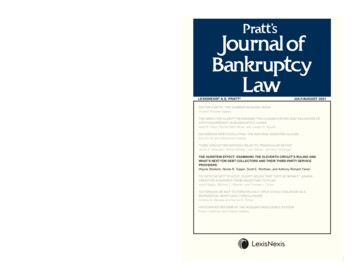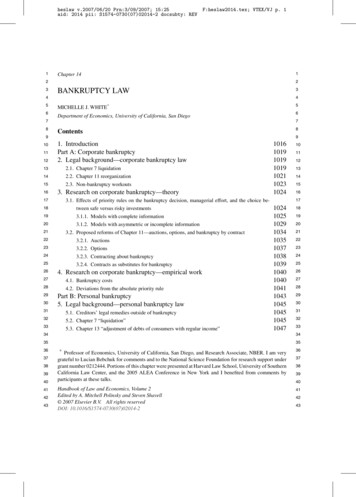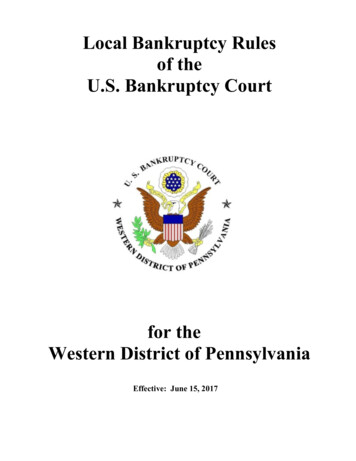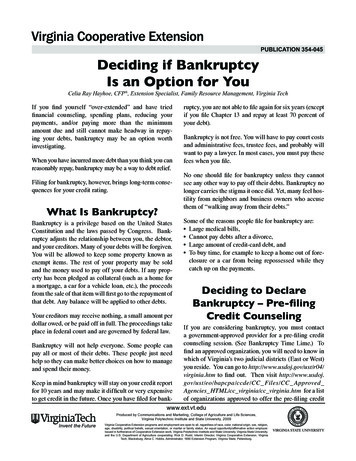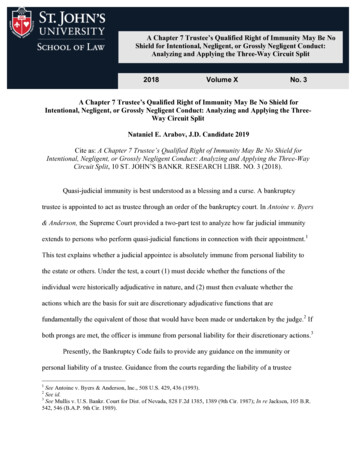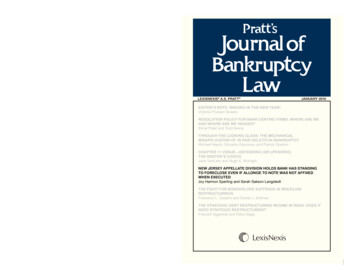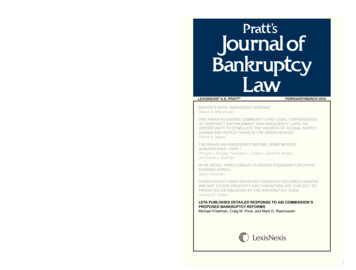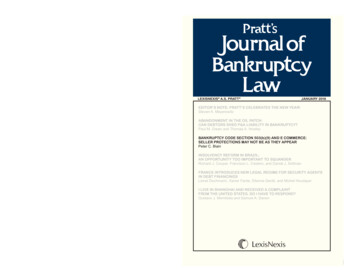
Transcription
PC / Ivory Vellum Carnival 35x23 / 80PRATT’S JOURNAL OF BANKRUPTCY LAWLEXISNEXIS A.S. PRATT JANUARY 2018EDITOR’S NOTE: PRATT’S CELEBRATES THE NEW YEAR!Steven A. MeyerowitzVOLUME 14 NUMBER 1ABANDONMENT IN THE OIL PATCH:CAN DEBTORS SHED P&A LIABILITY IN BANKRUPTCY?Paul M. Green and Thomas A. HowleyBANKRUPTCY CODE SECTION 503(b)(9) AND E COMMERCE:SELLER PROTECTIONS MAY NOT BE AS THEY APPEARPeter C. BlainINSOLVENCY REFORM IN BRAZIL:AN OPPORTUNITY TOO IMPORTANT TO SQUANDERRichard J. Cooper, Francisco L. Cestero, and Daniel J. SoltmanFRANCE INTRODUCES NEW LEGAL REGIME FOR SECURITY AGENTSIN DEBT FINANCINGSLionel Dechmann, Xavier Farde, Etienne Gentil, and Michel HoudayerJANUARY 2018I LIVE IN SHANGHAI AND RECEIVED A COMPLAINTFROM THE UNITED STATES. DO I HAVE TO RESPOND?Gustavo J. Membiela and Samuel A. Danon
Pratt’s Journal of BankruptcyLawVOLUME 14NUMBER 1JANUARY 2018Editor’s Note: Pratt’s Celebrates the New Year!Steven A. Meyerowitz1Abandonment in the Oil Patch: Can Debtors ShedP&A Liability in Bankruptcy?Paul M. Green and Thomas A. Howley4Bankruptcy Code Section 503(b)(9) and E-Commerce:Seller Protections May Not Be As They AppearPeter C. Blain24Insolvency Reform in Brazil: An Opportunity TooImportant to SquanderRichard J. Cooper, Francisco L. Cestero, andDaniel J. Soltman29France Introduces New Legal Regime for SecurityAgents in Debt FinancingsLionel Dechmann, Xavier Farde,Etienne Gentil, and Michel Houdayer43I Live in Shanghai and Received a Complaint from theUnited States. Do I Have to Respond?Gustavo J. Membiela and Samuel A. Danon48
QUESTIONS ABOUT THIS PUBLICATION?For questions about the Editorial Content appearing in these volumes or reprint permission,please call:Kent K. B. Hanson, J.D., at . 415-908-3207Email: . kent.hanson@lexisnexis.comOutside the United States and Canada, please call . . . . . . . . . . . . . . . (973) 820-2000For assistance with replacement pages, shipments, billing or other customer service matters,please call:Customer Services Department at . . . . . . . . . . . . . . . . . . . . . . . . . . (800) 833-9844Outside the United States and Canada, please call . . . . . . . . . . . . . . . (518) 487-3385Fax Number . . . . . . . . . . . . . . . . . . . . . . . . . . . . . . . . . . . . . . . . (800) 828-8341Customer Service Website . . . . . . . . . . . . . . . . . . . http://www.lexisnexis.com/custserv/For information on other Matthew Bender publications, please callYour account manager or . . . . . . . . . . . . . . . . . . . . . . . . . . . . . . .Outside the United States and Canada, please call . . . . . . . . . . . . . . . .(800) 223-1940(937) 247-0293Library of Congress Card Number: 80-68780ISBN: 978-0-7698-7846-1 (print)ISBN: 978-0-7698-7988-8 (eBook)ISSN: 1931-6992Cite this publication as:[author name], [article title], [vol. no.] PRATT’S JOURNAL OF BANKRUPTCY LAW [page number]([year])Example: Patrick E. Mears, The Winds of Change Intensify over Europe: Recent European UnionActions Firmly Embrace the “Rescue and Recovery” Culture for Business Recovery, 10 PRATT’S JOURNALOF BANKRUPTCY LAW 349 (2014)This publication is sold with the understanding that the publisher is not engaged in rendering legal,accounting, or other professional services. If legal advice or other expert assistance is required, the services ofa competent professional should be sought.LexisNexis and the Knowledge Burst logo are registered trademarks of Reed Elsevier Properties Inc., usedunder license. A.S. Pratt is a registered trademark of Reed Elsevier Properties SA, used under license.Copyright 2018 Reed Elsevier Properties SA, used under license by Matthew Bender & Company, Inc.All Rights Reserved.No copyright is claimed by LexisNexis, Matthew Bender & Company, Inc., or Reed Elsevier Properties SA,in the text of statutes, regulations, and excerpts from court opinions quoted within this work. Permission tocopy material may be licensed for a fee from the Copyright Clearance Center, 222 Rosewood Drive, Danvers,Mass. 01923, telephone (978) 750-8400.An A.S. Pratt PublicationEditorial Office230 Park Ave., 7th Floor, New York, NY 10169 (800) 543-6862www.lexisnexis.com(2018-Pub.4789)
Editor-in-Chief, Editor & Board ofEditorsEDITOR-IN-CHIEFSTEVEN A. MEYEROWITZPresident, Meyerowitz Communications Inc.EDITORVICTORIA PRUSSEN SPEARSSenior Vice President, Meyerowitz Communications Inc.BOARD OF EDITORSSCOTT L. BAENABilzin Sumberg Baena Price & Axelrod LLPLESLIE A. BERKOFFMoritt Hock & Hamroff LLPTED A. BERKOWITZFarrell Fritz, P.C.ANDREW P. BROZMANClifford Chance US LLPMICHAEL L. COOKSchulte Roth & Zabel LLPMARK G. DOUGLASJones DayMARK J. FRIEDMANDLA PiperSTUART I. GORDONRivkin Radler LLPPATRICK E. MEARSBarnes & Thornburg LLPDERYCK A. PALMERPillsbury Winthrop Shaw Pittman LLPiii
PRATT’S JOURNAL OF BANKRUPTCY LAW is published eight times a year by MatthewBender & Company, Inc. Copyright 2018 Reed Elsevier Properties SA., used under license byMatthew Bender & Company, Inc. All rights reserved. No part of this journal may be reproducedin any form—by microfilm, xerography, or otherwise—or incorporated into any informationretrieval system without the written permission of the copyright owner. For permission tophotocopy or use material electronically from Pratt’s Journal of Bankruptcy Law, please accesswww.copyright.com or contact the Copyright Clearance Center, Inc. (CCC), 222 RosewoodDrive, Danvers, MA 01923, 978-750-8400. CCC is a not-for-profit organization that provideslicenses and registration for a variety of users. For subscription information and customer service,call 1-800-833-9844.Direct any editorial inquires and send any material for publication to Steven A. Meyerowitz,Editor-in-Chief, Meyerowitz Communications Inc., 26910 Grand Central Parkway, No. 18R,Floral Park, NY 11005, smeyerowitz@meyerowitzcommunications.com, 718.224.2258. Materialfor publication is welcomed—articles, decisions, or other items of interest to bankers, officers offinancial institutions, and their attorneys. This publication is designed to be accurate andauthoritative, but neither the publisher nor the authors are rendering legal, accounting, or otherprofessional services in this publication. If legal or other expert advice is desired, retain theservices of an appropriate professional. The articles and columns reflect only the presentconsiderations and views of the authors and do not necessarily reflect those of the firms ororganizations with which they are affiliated, any of the former or present clients of the authorsor their firms or organizations, or the editors or publisher. POSTMASTER: Send address changesto Pratt’s Journal of Bankruptcy Law, LexisNexis Matthew Bender, Attn: Customer Service, 9443Springboro Pike, Miamisburg, OH 45342-9907.iv
PRATT’S JOURNALOFBANKRUPTCY LAWBankruptcy Code Section 503(b)(9) andE-Commerce: Seller Protections May NotBe As They AppearBy Peter C. Blain*Two recent cases have ruled that the word “received” in Section 503(b)(9)of the U.S. Bankruptcy Code means the debtor taking actual, physicalpossession of the goods. The author of this article discusses these decisions,which will have significant impact on the sellers of goods who drop ship, ordeliver the goods directly, to the debtor’s customers.As part of the Bankruptcy Abuse and Consumer Protection Act of 2005,Congress included Section 503(b)(9) of the U.S. Bankruptcy Code,1 whichgrants administrative expense priority to ordinary course sellers of goods wherethe goods are received by the debtor within the 20 days preceding the filing ofthe bankruptcy petition. Two recent cases have ruled that the word “received”in Section 503(b)(9) means the debtor taking actual, physical possession of thegoods. These decisions will have significant impact on the sellers of goods whodrop-ship, or deliver the goods directly, to the debtor’s customers. In theexploding world of e-commerce, sellers are increasingly directing their vendorsto drop-ship goods directly to the sellers’ customers, thereby avoiding the needto finance the acquisition of a substantial stock of inventory. Under these recentdecisions, vendors drop-shipping goods to third-party buyers are not entitled toCode Section 503(b)(9)’s enhanced protections. This significantly changes thecredit risk which vendors assume in these types of transactions.IN RE SRC LIQUIDATION, LLC2Standard Register Company (“SRC”) filed a petition under Chapter 11 ofthe Code and entered into an asset purchase agreement (“APA”) providing forthe purchase of certain assets and the assumption by the buyer of certainliabilities, including Code Section 503(b)(9) claims. The agreement wasapproved by the bankruptcy court and the sale closed. The buyer, which had theright to designate a party to acquire the assets and assume the liabilities under*Peter C. Blain is a shareholder at Reinhart Boerner Van Deuren s.c. and chair of the firm’sBusiness Reorganization Practice, representing diverse parties in complex distress transactionsboth in and outside of bankruptcy proceedings, including lenders, debtors, trustees, committees,and other creditors. He may be contacted at pblain@reinhartlaw.com.111 U.S.C. §§ 101–1532 (hereinafter “Code”).2In re SRC Liquidation, LLC, 573 B.R. 537 (Bankr. D. Del. 2017).24
BANKRUPTCY CODE SECTION 503(b)(9)ANDE-COMMERCE: SELLER PROTECTIONSthe APA, designated Standard Register, Inc. (“Standard”). After the closing ofthe sale, SRC confirmed a Plan of Liquidation which provided that Standard asdesignee had the exclusive authority to resolve any disputed claims against SRC.In the 20 days preceding the Chapter 11, International Imaging Materials,Inc. (“IIM”) delivered some goods to SRC, and other goods directly to SRC’scustomers at SRC’s direction using SRC’s account with United Parcel Service.Standard agreed that the claim for goods delivered directly to SRC was entitledto administrative expense priority under Code Section 503(b)(9), but objectedto IIM’s administrative claim for 48,000 for goods delivered directly to SRC’scustomers.The court began its decision by noting the language of Section 503(b)(9)required goods to be “received by the debtor” within 20 days of the filing of thebankruptcy petition, and by reviewing the Uniform Commercial Code’s(“UCC”) definition of “receipt.”3 Under the UCC, said the court, “receipt”means taking physical possession of goods, unless the context requiresotherwise.4 The “context requiring otherwise” includes the right to stop goodsin transit under UCC § 2-705 until the goods are received by the buyer orconstructively received by the buyer’s agent, thereby triggering the seller’sreclamation rights under UCC § 2-702.5Relying on the U.S. Court of Appeals for the Third Circuit’s decision inMarin Motor Oil,6 Standard argued that IIM’s delivery of goods directly to thecustomer did not qualify as “receipt by the debtor” under the UCC. IMMsought to distinguish Marin, noting that the case related not to Code Section503(b)(9), but to Code Section 546, which provides that the rights of a debtorin goods are subject to the rights of the seller to reclaim them.7 Code Section503(b)(9), argued IIM, may include constructive receipt situations differentfrom those established in UCC § 2-705. Moreover, courts using UCC § 2-705to interpret receipt of goods under Code Section 546 (the reclamation section)ignore the commercial realities surrounding Code Section 503(b)(9) claims.8Only the passage of title, argued IIM, can provide a clear answer as to whether3Id.4Id.5Id.6Montello Oil Corp. v. Marin Motor Oil, Inc. (In re Marin Motor Oil, Inc.), 740 F.2d 220 (3dCir. 1984).7In re SRC Liquidation, LLC, supra.8Id.25
PRATT ’S JOURNALOFBANKRUPTCY LAWthe debtor received goods.9The court rejected IIM’s arguments, holding that, although the remediesunder Code Sections 503(b)(9) and 546 are different, because Code Section546 provides that if a seller fails to comply with the section’s requirements forreclamation,10 it is still entitled to the priority set forth in Code Section503(b)(9), the two sections are linked.) Consequently, “the words ‘received’ inboth provisions are related and entitled to identical interpretation.”11 Inaddition, said the court, the UCC does not rely on the concept of “title” todefine the rights of buyers and sellers. Rather, possession is the key concept.12IN RE WORLD IMPORTS, LTD.13In reaching its decision, the SRC court relied heavily on In re World Imports,Ltd., decided by the Third Circuit Court of Appeals while the SRC case was stillpending. In World Imports, goods were shipped from China “free on board”(“FOB”) at the port of origin, passing the risk of loss and title to the goods todebtor World Imports upon transfer at the port. The goods were shipped morethan 20 days before the bankruptcy filing, but were physically received by thedebtor within the 20 days preceding the filing. Because Code Section 503(b)(9)does not define the term “received,” the sellers asserted a Code Section503(b)(9) claim, arguing the bankruptcy court should look to the UCC forguidance on the words “received by the debtor.” The bankruptcy court rejectedthis approach and instead looked to the Contracts for the International Sale ofGoods (“CISG”), and found that, under the CISG, goods were constructivelyreceived by the debtor when they were loaded for transit in China. Because thisoccurred more than 20 days preceding the bankruptcy filing, the court deniedthe sellers’ Code Section 503(b)(9) claim. The district court affirmed and thesellers appealed to the Third Circuit Court of Appeals.The Court of Appeals began by indicating that words should be construed inaccordance with their ordinary meaning. The court observed that “Black’s LawDictionary defines ‘receive’ as ‘[to] take . . . ; to come into possession of or to9Id.10Code § 546(c) provides that a reclaiming seller of goods must make a reclamation demandnot later than 45 days after the debtor’s receipt of the goods, or if the 45 days expires after thecommencement of the case, within 20 days after the commencement of the case.11In re SRC Liquidation, LLC, supra.12Id.13In re World Imps., Ltd., 862 F.3d 338 (3d Cir. 2017).26
BANKRUPTCY CODE SECTION 503(b)(9)ANDE-COMMERCE: SELLER PROTECTIONSget from some outside source,’”14 and “The Oxford English Dictionary defines‘receive’ with respect to physical goods, as ‘[t]o take into one’s hands or one’spossession (something offered or given by another); to take delivery of(something) from another either for oneself or for a third party.’”15 Thesedefinitions, said the court, require physical possession of goods. Applying thesedefinitions to Code Section 503(b)(9), the court concluded that “a debtor must‘take’ goods into its ‘possession,’ ‘custody,’ or ‘hands’ in order to receive them.”The court said this definition comports with the UCC definition of “receipt”of goods as “taking possession of them.”16The Third Circuit noted that because Congress borrowed Code Section 546’sreclamation provision from the UCC, and because Code Section 546 and503(b)(9) were interrelated because Code Section 503(b)(9) applies even ifCode Section 546’s requirements cannot be met, “receipt” under both sectionsshould be interpreted the same. It referred to its earlier decision in Marin MotorOil, where, as noted above, it held that “receipt” in Code Section 546 has thesame meaning as that in the UCC. Extending the rationale of Marin to“receipt” under Code Section 503(b)(9), the court said that neither the debtornor the courts below pointed to anything that suggested Congress intendedCode Sections 503(b)(9) and 546 to interpret the word “received” differently.17The debtor argued that it constructively received the goods when they weredelivered FOB to the common carrier—well outside of the 20-day period.Rejecting this assertion, the court noted that, under the UCC, a commoncarrier is not the “buyer’s agent” for the purposes of receipt of goods. Deliveryto a common carrier may shift the risk of loss and transfer title, but, as Marinmade clear, title is not a concept used in determining the rights of buyers andsellers of goods under the UCC.18 Reversing, the court said that, under CodeSection 503(b)(9), physical possession of the goods by the debtor, not theshifting of the risk of loss or the transfer of title, was the determinative factor.Because a common carrier is not the debtor’s agent for the purposes ofpossession, possession takes place when the debtor actually, physically receivesthe goods, which in this case was within the Code Section 503(b)(9) 20-dayperiod.1914Id. at 342 (citing Black’s Law Dictionary (10th ed. 2014)).15Id. (citing Oxford English Dictionary (3d ed. 2009)).16Id.17Id. at 345.18Id.19Id. at 346.27
PRATT ’S JOURNALOFBANKRUPTCY LAWCONCLUSIONSRC and World Imports, although appearing to be correctly decided, certainlynarrow the protection to sellers of goods Code Section 503(b)(9) appears toprovide. Many debtors, particularly retail debtors, are desperately trying toreduce costs to survive in an environment that is undergoing a seismic shift dueto e-commerce. Reducing costs by minimizing the stock of inventory debtorsown and have to finance by having their vendors drop-ship goods directly to thedebtor’s customers who order online is an obvious strategy. However, thevendors who agree to drop-ship goods at the debtor’s request using the debtor’sUPS account (as was the case in SRC) must do so knowing that their credit riskis now much greater.28
PC / Ivory Vellum Carnival 35x23 / 80 LEXISNEXIS . to Pratt's Journal of Bankruptcy Law, LexisNexis Matthew Bender, Attn: Customer Service, 9443 Springboro Pike, Miamisburg, OH 45342-9907. iv. Bankruptcy Code Section 503(b)(9) and E-Commerce: Seller Protections May Not Be As They Appear By Peter C. Blain* Two recent cases have ruled that the word "received" in Section 503(b)(9) of the .
